Completed evaluations
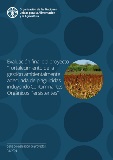
Terminal evaluation of the project “Strengthening of capacities for environmental sound management of POP-pesticides in Uruguay
22/07/2024
The results of the evaluation indicate that the project began a priority process to combine productive, environmental and health approaches in relation to strengthening pesticide management. The recommendations focus on compliance with the work plan and monitoring the elimination proposal, and updating and strengthening the regulatory framework.
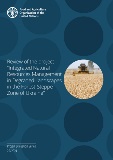
Terminal evaluation of the project "Integrated Natural Resources Management in Degraded Landscapes in the Forest-Steppe Zone of Ukraine"
04/07/2024
The project’s objective was to promote the restoration of degraded landscapes in the forest-steppe and steppe zones of Ukraine by scaling up integrated natural resources management practices. Despite challenges caused by the ongoing war, the project’s activities and incentives stand out as good practices to replicate. The project significantly implemented successful capacity building, which led to increased information sharing and the development of draft laws on environmental protection.
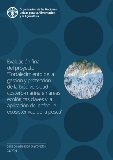
Terminal evaluation of the project "Governance Strengthening for the Management and Protection of Coastal & Marine Biodiversity in key ecological areas and the implementation of the Ecosystem Approach to Fisheries"
04/07/2024
The project focused on improving the management and protection of marine biodiversity and promoting the ecosystem approach to fishing. The evaluation highlighted the high relevance and coherence of the project, as well as the institutional strengthening and development of technical capacities. The creation of synergies, instances of dialogue and high-quality lasting results also stands out.
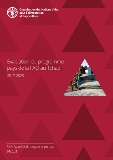
Evaluation of the FAO country programme for Chad 2017–2023
04/07/2024
Le positionnement de la FAO au Tchad sur les grands domaines prioritaires du pays lui confère d'emblée un avantage comparatif certain. La FAO est fortement présente au Tchad et occupe une place centrale dans la coordination des actions dans le domaine de l'alimentation et de la nutrition. Les projets d’urgence dominent le portefeuille, au détriment du développement des chaînes de valeur et de la gestion des ressources naturelles.
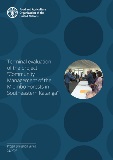
Terminal evaluation of the project “Community Management of Miombo Forests in South-East Katanga”
04/07/2024
The project aimed to promote sustainable management and restoration of Miombo forest ecosystems in the South-East of Katanga. The performance of the project to be generally satisfactory. The report presents the salient results of the project, the lessons to be taken into account as well as the measures to be applied to consolidate the achievements, ensure their sustainability and promote impact.
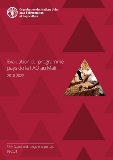
Evaluation of the FAO country programme in Mali 2018-2022
20/06/2024
FAO's positioning as a “post-rapid response mechanism actor” gives it a comparative advantage in terms of supporting recovery, strengthening livelihoods and resilience. The Hand in Hand initiative has ensured cohesion between agropoles by contributing to the development of investment plans in promising sectors through consultations at the local level. However, actions in the agri-food industry remain ad hoc and insufficiently prepared.
Evaluation of the project "Enhancing Livelihoods and Food Security though Fisheries with Nearshore Fish Aggregating Devices in the Pacific Ocean"
11/06/2024
The evaluation found that the project approach was relevant. The project team’s concerted efforts enabled flexible implementation despite the challenges posed by the COVID-19 pandemic. The evaluation found evidence of success. This included the development of human capital by enhancing specific technical skills and broad-based business literacy. The evaluation recommended to develop an integrated nFAD database and to institutionalize the use of nFAD to ensure sustainability.
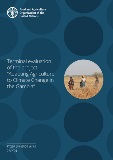
Terminal evaluation of the project "Adapting Agriculture to Climate Change in the Gambia"
10/06/2024
The project built capacities of implementing partner institutions, civil society organizations and farmer-based organizations, and supported the establishment of vegetable gardens for increased income and nutrition security of beneficiary communities. The planned animal drinking points would facilitate watering of animals. Other established schemes like beekeeping, poultry and small ruminants will also contribute to increasing beneficiary income-earning capacities.
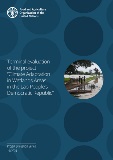
Terminal evaluation of the project “Climate Adaptation in Wetlands Areas in the Lao People's Democratic Republic”
30/05/2024
Evidence-based planning and mainstreaming of climate change adaptation, disaster risk management and wetland conservation has been conducted in regular planning exercises, training of government staff and participating communities. A major threat continues to be encroachment of wetlands for rice cultivation and use of chemical fertilizer and pesticides in rice fields.
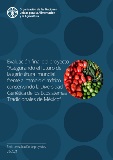
Terminal evaluation of the project “Securing the Future of Global Agriculture in the face of climate change by conserving the Genetic Diversity of the Traditional Agroecosystems of Mexico”
30/05/2024
The evaluation results highlight both the project`s high relevance to national and global priorities by its contribution to the supply of nutritious food, genetic diversity conservation, and resilient production systems in the face of climate change; and its coherence, which fostered internal and external collaborative relationships. Furthermore, achievements in knowledge availability, capacity development, inter-institutional coordination, and communication strategies are also noteworthy.
